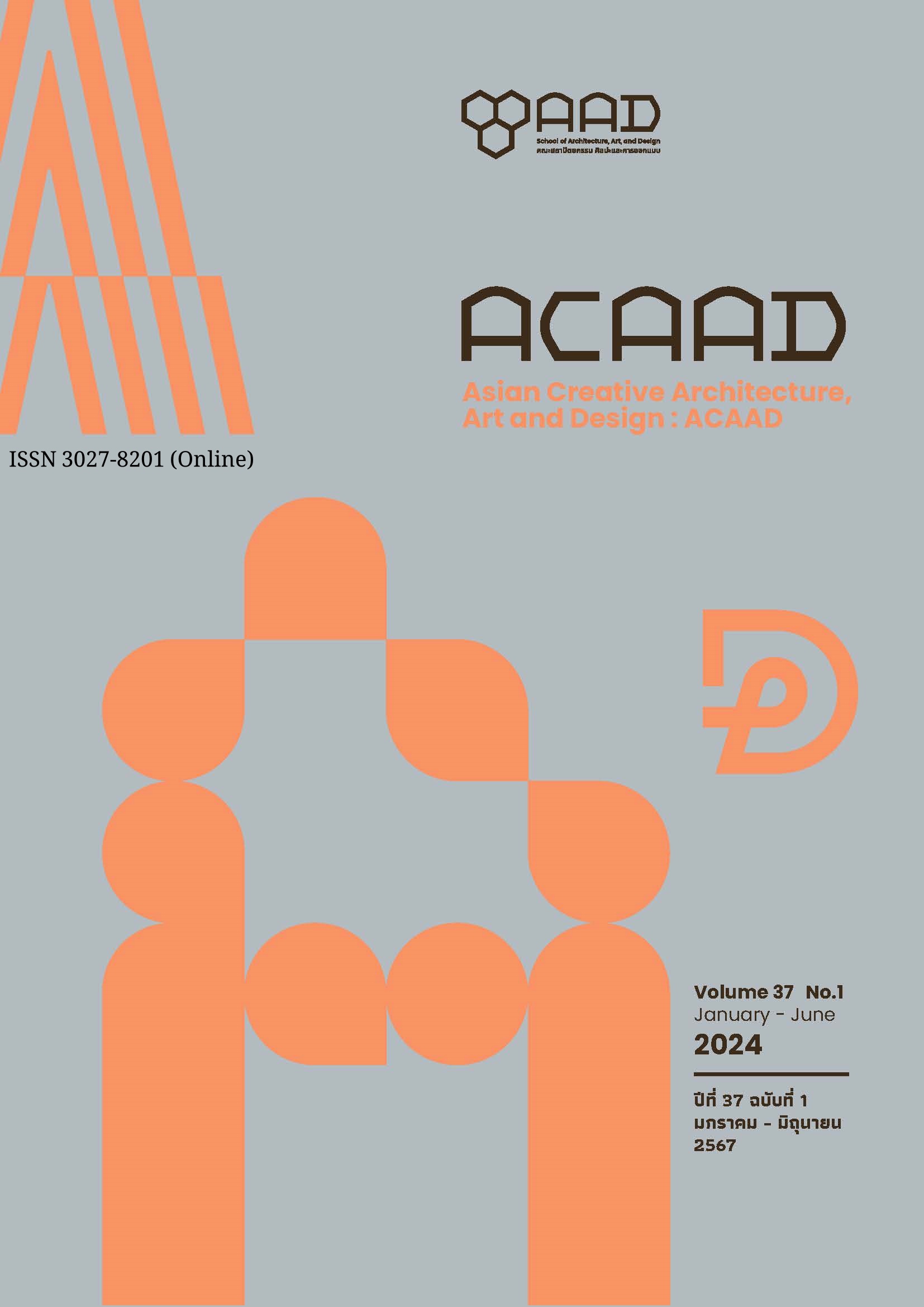Semiotic Power in Films of Apichatpong Weerasethakul
Main Article Content
Abstract
This research aims to analyze the semiotic power in the films of Apichatpong Weerasethakul through a qualitative study approach. The researcher employs methods of textual and contextual analysis, utilizing semiotics theory and intermedial references, including intermedial topography. Data are collected from films, articles, interviews, and critiques. Additionally, in-depth individual interviews are conducted to reflect and support the data obtained from film analysis. The selection of purposive sampling focuses on feature-length entertainment films where Apichatpong Weerasethakul serves as both the screenwriter and director, and the films have received awards or nominations at international film festivals such as Cannes. The total number of films selected for analysis is five: "Blissfully Yours" (2002), "Tropical Malady" (2004), "Uncle Boonmee Who Can Recall His Past Lives" (2010), "Cemetery of Splendour" (2015), and "Memoria" (2021).
The research findings reveal that semiotic analysis, following semiotics theory, delves deep into the films, encompassing both denotative and connotative meanings. It emphasizing themes like medicine and public health, forests, myth, gender, politics, memory, love, sleep, truth & illusion, marginal people, time, instinct, and orchids. Through intermedial analysis, the use of symbols to create meaning is evident, fostering diverse media networks that broaden understanding and interpretation. These symbols span various genres such as auteur, ghosts of Thai folklore, experimental, sci-fi, Hollywood, and postmodernist. In-depth interviews correlate with themes of semiotic power related to forests, politics, medicine, and public health, facilitating creative exchanges. Even without direct communication, symbols convey connotative meanings effectively. With their performance skills and memories, the director and actors act as intermediaries, fostering profoundly meaningful works.
Article Details

This work is licensed under a Creative Commons Attribution-NonCommercial-NoDerivatives 4.0 International License.
This work is licensed under a Creative Commons Attribution-NonCommercial-ShareAlike 4.0 International License.
Copyright Transfer Statement
The copyright of this article is transferred to Journal of The Faculty of Architecture King Mongkut's Institute of Technology Ladkrabang with effect if and when the article is accepted for publication. The copyright transfer covers the exclusive right to reproduce and distribute the article, including reprints, translations, photographic reproductions, electronic form (offline, online) or any other reproductions of similar nature.
The author warrants that this contribution is original and that he/she has full power to make this grant. The author signs for and accepts responsibility for releasing this material on behalf of any and all co-authors.
References
Barthes, R. (1984). Mythologies, trans. Annette Lavers. The Noonday Press.
Film Archive Thailand. (2019, January 3). Film Club: "Forest in Films" [Video]. Youtube. https://www.youtube.com/watch?v=qc6x8od8eww (in Thai)
Fuhrmann, A. (2016). Ghostly desires: Queer sexuality and vernacular Buddhism in contemporary Thai cinema. Duke University Press.
Haig, M. (2022). Notes on a Nervous Planet. (S. Tanoi, Trans.). (Original work published 2018).
Hawkes, T. (1977). Structuralism & semiotics. https://archive.org/details/structuralismsem00tere/page/n199/mode/2up
IMBD. (2023). Apichatpong Weerasethakul. https://www.imdb.com/name/nm0917405/
Ingawani, A. (2013). Animism and The Performative Realist Cinema of Apichatpong Weerasethakul. https://www.berghahnbooks.com/downloads/OpenAccess/PickScreening/PickScreening_05.pdf
Jindawong, K. (2008). Narrative Structure Analysis in the Films of Apichatpong Weerasethakul. Chiang Mai University. (in Thai)
Kaewthep, K. (2010). New Perspectives in Communication Studies. Phappim. (in Thai)
Kalpapruek. (2005). Four Great Directors of East Asia. Openbooks Publishing. (in Thai)
Kick the Machine. (2024). Conversation with the Sun (VR) [Facebook page]. Facebook. Retrieved February 3, 2024, from https://www.facebook.com/kickthemachine.official (in Thai)
Koetdee, K. (2005). Teaching materials on the introductory theory and criticism of films. Department of Communication Arts, Sukhothai Thammathirat Open University. Sukhothai Thammathirat Open University Press. (in Thai)
Louiyapong, K., & Hinwiman, S. (2009). Love and Confusion in Thai Films: Three Decades of Thai Cinema (1977-2004). Sayam Publishing. (in Thai)
Patcharawit, K. (2015). Thai Independent Films and Reflections on Thai Social Issues. Asian Creative Architecture, Art and Design, 21(2), 133-144. https://so04.tci-thaijo.org/index.php/archkmitl/article/view/47516
Polmuk, C. (2015). Returning to Isan: Illusory Dreams and the Violence of the Metropolis in the Films "Full Moon Night" and "Uncle Boonmee Who Can Recall His Past Lives". Journal of Arts, 44(2), 33-70. https://so03.tci-thaijo.org/index.php/jletters/article/view/48834/40571
Polmuk, C. (2016). Book Review: Ghostly Desires: Queer Sexuality and Vernacular Buddhism in Contemporary Thai Cinema. Journal of Mekong Societies, 12(3), 187–198. https://so03.tci-thaijo.org/index.php/mekongjournal/article/view/73325
Rithdee, K. (2021, July 16). "Memoria" by Apichatpong Weerasethakul from the perspective of Kong Rithdee. https://www.bbc.com/thai/thailand-57859175 (in Thai)
Royal Society of Thailand. (2011). Royal Institute Dictionary, B.E. 2554 (2011). Retrieved July 11, 2023, from https://dictionary.orst.go.th/ (in Thai)
Saisongkhroh, W. (2018, January 21). Viewing Thai Society Through a Long Lens: The Perspective of ‘Apichatpong Weerasethakul’. https://thematter.co/entertainment/apichatpong-weerasethakul-interview/44131 (in Thai)
Sarris, A. (2013). Condensed Notes to “Notes on The Auteur Theory In 1962”. https://anthologyfilmarchives.tumblr.com/post/43758490902/condensed-notes-to-notes-on-the-auteur-theory-in
Subyen, S., & Watcharatanin, T. (2010). The Operation of Cross-national Film Capital: The Ordinary Life Curriculum Goes International. Openbooks Publishing. (in Thai)
Suttisima, V. (2004, August 1). Watching Movies in Books: The Adventure of Iron Pussy. Starpics Magazine, 626, 101-102. Suwan Studio. (in Thai)
TaengAksorn, P. (2022, March 8). Memoria (2021): The Resounding Sound of Wounds and Memories. https://thestandard.co/opinion-memoria-film/ (in Thai)
Tepharak, B. (2011, March 1). The World of Apichatpong Weerasethakul (Knowing Apichatpong Weerasethakul and His Works from His Own Words). Starpics Magazine, 795, 86-92. Suwan Studio. (in Thai)
Tiravanija, R. (2011). Apichatpong Weerasethakul. Primitive Paperback. New Museum of Contemporary Art.
Unjanam, P. (2016, May 19). Cemetery of Splendor. https://prachatai.com/journal/2016/05/65873 (in Thai)
Weerasethakul, A. (Producer, Writer & Director). (2002). Blissfully Yours. (DVD). Bangkok, Mangpong Corporation Public Company Limited.
Weerasethakul, A. (Producer, Writer & Director). (2004). Tropical Malady. (DVD). Bangkok, Mangpong Corporation Public Company Limited.
Weerasethakul, A. (2007). Unknown Forces: The Illuminated Art of Apichatpong Weerasethakul. Openbooks Publishing. (in Thai)
Weerasethakul, A., Weber, M., Griffiths, K., Miñarro, Field, S., & Geissendörfer, H. (Producer) (2010). Uncle Boonmee Who Can Recall His Past Lives. [Video]. Netflix. https://www.netflix.com/th/title/70139516
Weerasethakul, A., Weber, M., Griffiths, K., Meaux, C., Field, Geissendörfer, H., & Suwannasorn, S. (Producer) (2015). Cemetery of Splendour. [Video]. Prime video https://www.primevideo.com/detail/Cemetery-of-Splendour/0JMM5BD8OX9LBR7728P74N83ZU
Weerasethakul, A. (Producer, Writer & Director). (2023). Memoria. (DVD). New Zealand, Madmanfilms.
Widener, J. P. (2023, July 28). Work Experience and Film Acting by Apichatpong Weerasethakul. [Interview]. UBU Library; Ubon Ratchathani University. https://opac.lib.ubu.ac.th/Catalog/BibItem.aspx?BibID=b00229276 (in Thai)


